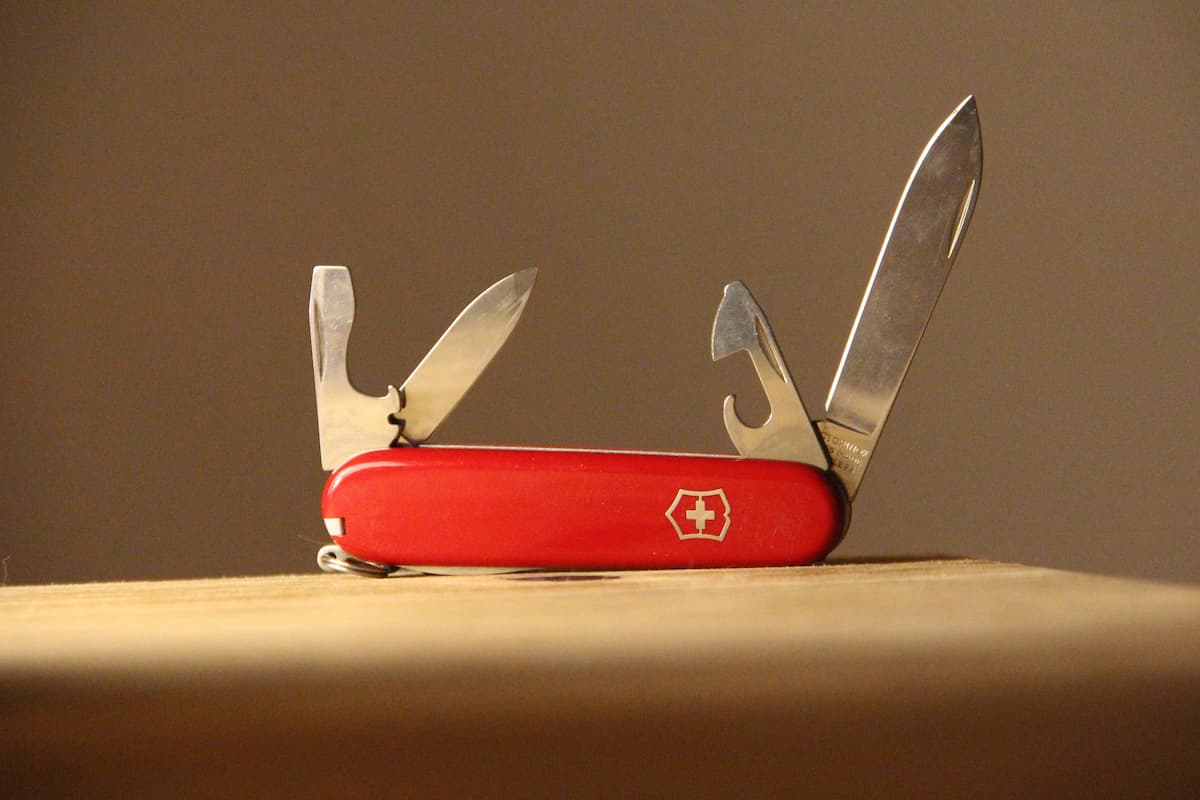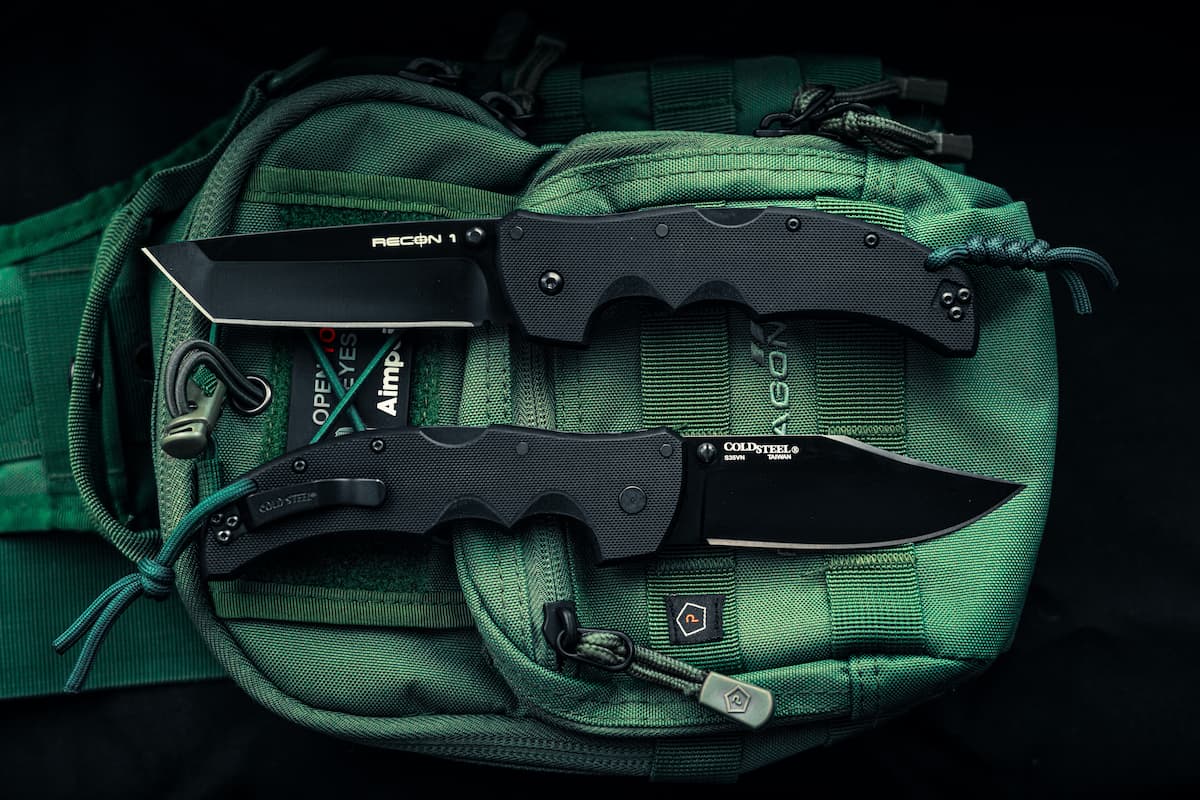Can You Bring A Swiss Army Knife On A Plane? (TSA Dos and Don’ts)
It can be challenging to pack for an adventure where specific tools like a Swiss Army knife may be necessary.
When it comes to items like Swiss Army knives, airlines, security personnel, and destination countries all have rules surrounding what is and isn’t permitted.
According to the TSA, airplane passengers cannot pack a Swiss Army knife into their carry-on luggage. However, travelers can put Swiss Army knives and other sharp objects in their checked bags as long as the items are permitted at the final destination. All blades and tools should be closed and secured safely to avoid injuring the security personnel checking the bags during the screening process.
The following article reviews the policies and restrictions for bringing Swiss Army knives on a plane.
Can You Bring a Knife Through Security at US Airports?

The Transportation Security Administration (TSA) generally states that knives are not permitted in carry-on luggage unless they are plastic or have a rounded edge (like a butter knife).
Passengers can bring knives in their checked bags as long as they are packed safely and will not injure any security personnel or inspectors who screen the luggage.
Airline Policies on Sharp Objects
Travelers in the United States should follow the TSA guidelines carefully.
Passengers who fail to follow the guidelines can have their items confiscated at security checkpoints or during security inspections.
Sometimes, even when a traveler follows the recommended guidelines, TSA agents may still choose to confiscate an item they deem dangerous or inappropriate for travel on an airplane.
This experience can be frustrating, so it’s always best to be cautious when packing for air travel.
In addition, different airline carriers may have slightly more restrictive policies than those used by the TSA.
Before traveling, passengers should call their airline carrier to be sure items are permitted on board as either carry-on or checked luggage.
Packing Sharp Objects in Carry-On vs. Checked Luggage
In addition to knives, passengers often want to carry other sharp objects onto planes, including syringes, scissors, sewing and knitting needles, corkscrews, saws, hatchets, axes, razor blades, box cutters, harpoons, darts, swords, and other martial arts equipment.
Generally, passengers can transport certain sharp objects in their checked luggage as long as the blade ends are wrapped and secured tightly.
Security personnel frequently conduct inspections of checked bags and can confiscate items they deem dangerous.
Packing sharp objects in carry-on bags is highly discouraged because TSA regulations don’t allow most sharp items through security.
Travelers can only carry a few specific sharp items through TSA security checkpoints, including corkscrews without a blade, sewing needles, knitting needles, and small scissors with blades shorter than four inches (10 cm) at the pivot point, like sewing scissors.
Passengers can also carry unused syringes when accompanied by injectable medicine or used syringes in a hard-surface container like a Sharps disposal container.
However, all people traveling with injection equipment must declare their syringes to TSA officers at security checkpoints.
Additionally, while the TSA may allow certain items through security at US airports, customs regulations in your destination country may have different guidelines that must be respected.
Can You Travel Internationally With Knives and Other Sharp Objects?

Within the United States, TSA regulations dictate what passengers can carry onto planes, supported by individual airline carriers that control what travelers can check into their luggage.
International air travel can be far more complicated, as every country is governed by its own customs rules, which outline what is and isn’t allowed within their borders.
Travelers should always check the customs regulations for each country they’re traveling to before they pack their bags.
In addition, foreign airline carriers may have different restrictions on items packed in checked luggage, and travelers should confirm these rules prior to leaving their homes.
Many places also do not permit visitors to carry certain types of knives, including Swiss Army knives, so it’s important to confirm the laws of each destination country before arriving.
Ultimately, traveling with sharp objects can be more complicated than they’re worth, so it’s best to leave them behind unless they’re absolutely necessary.
Conclusion
Swiss Army knives are an incredibly useful tool but can make air travel challenging.
Passengers traveling throughout the United States can bring Swiss Army knives in their checked luggage; however, if the knife is found on a person or in a carry-on, it will be confiscated.
In addition to Swiss Army knives, travelers should pack most sharp objects into checked luggage to avoid uncomfortable encounters with airport security.
Only a few sharp objects are allowed through security at US airports (like knitting needles or sewing scissors), so confirm what’s allowed with the TSA before heading to the airport.
If traveling internationally, passengers should confirm what is permitted on the aircraft before packing their bags.
Additionally, every country has its own rules regarding knives and other sharp objects, so it’s crucial to familiarize yourself with local laws before bringing anything potentially dangerous into another country.